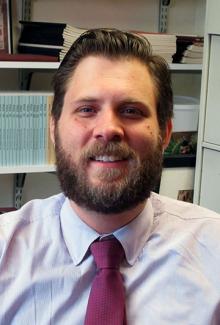
I spent most of my childhood in the Midwest, but moved to the Nashville area during high school. I went to the University of Tennessee, Knoxville for my BA, so I consider Tennessee to be home. As a kid I loved reading, exploring, and languages (I used to make up my own for fun), and I think all of these passions translated well into my study of Sanskrit.
As a freshman, I took a course from Dr. James L. Fitzgerald entitled "Religious Aspects of Modern Indian Literature." I remember being fascinated by the topic--I had never considered studying India before this class. I remember going to his office hours, and in the course of our conversation he suggested I should read the Mahābhārata. After that I was totally hooked. He started to teach me Sanskrit, and I ended up going to UC Berkeley to study with Dr. Robert Goldman.
What are your research interests? Where are these interests root?
My research focuses on the literary history of Kashmir. I am particularly interested in the formation of a particularly Kashmiri genre of historical writing in Sanskrit. The first exemplar of this genre, Kalhaṇa's Rājataraṅgiṇī, was completed in 1158/59. During the Sultanate period, Sanskrit intellectuals looked back to this text to fashion their own accounts of the Sultanate. In tracing the development and deployment of this type of historical literature, I try to tease out a specifically regional type of Kashmiri Sanskrit.
I am also working on the Kashmiri translation of a Persian Sufī-themed text into a Sanskrit Śiva-worshipping poem. Entitled theKathākautuka or "The Wonder of Story", this text shows the possibilities and dangers inherent in translating between both elite literary and religious traditions.
I supplement this work with sustained interest in Buddhism in South Asia. My area of interest concentrates especially on late phase (mainly Tantric) Buddhism and issues of the disappearance of Buddhism in South Asia.
What are you working on at the moment?
Right now I am putting the finishing touches on my dissertation. I do hope to turn this into a book and also publish translations of the primary texts the provided the backbone of my research. I continue to collect and study Sanskrit texts produced during the Sultanate period, and do hope to undertake a larger project on "Sultanate Sanskrit." I am also working with a colleague from Nepal to edit a previously unpublished and early commentary on Kālidāsa's Kumārasaṃbhāva(The Origin of the Young God), we should have an edition of the first section out later this year.
What sort of transformations or developments do you hope to see within your field in coming years?
I think it is an exciting time in the study of pre-modern South Asia. I think a resurgent and critical interest in the role of philology (both as a modern academic discipline and as a methodology employed by writers we study themselves) can lead to productive and I think revolutionary ways of conceptualizing intellectual culture in the non-modern non-west. I am very excited to see scholars thinking through categories of interpretation and students' willingness to tackle hard texts and issues.
What courses are you teaching this semester? What courses are you teaching in future?
Right now I am teaching three levels of Sanskrit, introductory, intermediate, and advanced. The introductory course is an in-depth introduction to the grammar of the classical language. The goal is to be able to read Sanskrit by the end of the year, but I also teach some poetry, recitation, and conversation. In the intermediate class, we are reading an episode from the Mahābhārata (my first love) in which the great hero Arjuna fights the great god Śiva in disguise. The advanced class is reading aesthetic philosophy from Mammaṭa'sKāvyaprakāśa.
Next semester I will be continue teaching grammar in the first year class. Intermediate will be reading selections from Kālidāsa's great poems the Raghuvaṃśa (The Lineage of Raghu) andKumārasaṃbhāva (The Origin of the Young God). I think we will look specifically at lament literature in the context of these poems. I am also very excited for the advanced class, we will be reading Buddhist tantric literature, looking specifically at what practices and visualizations are described in the Guhyasamāja (Secret Assembly) tradition.
In the future I will try to alternate between poetry, philosophy, and tantra/purāṇa. There is so much to be read and to think about in Sanskrit, I hope to provide a few glimpses to get students excited too!
Can you share with us some of your experiences and thoughts of Penn and the city of Philadelphia?
For me, Philadelphia was love at first sight. I really enjoy wandering and biking through the area, I like the different feels that the different neighborhoods have. Penn has also been a great experience, the students are engaged and engaging, the faculty very supportive and interesting, and the department is active.
What are some of your other interests, outside of academics?
I'm a fairly avid bicyclist and have been enjoying the bike trails in the area. I am also always on the look out for new television shows to get into, so if you have any suggestions, let me know.
